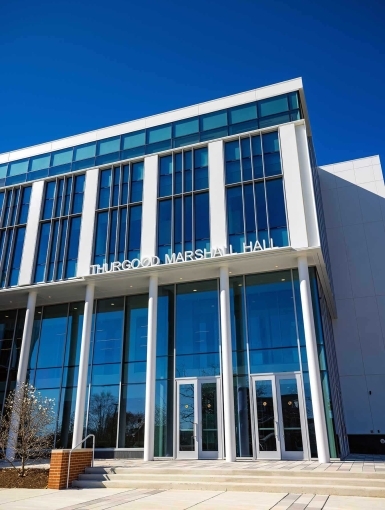
School of Public Policy Building Now Honors Late Civil Rights Lawyer and Former U.S. Supreme Court Justice
The University of Maryland celebrated today the naming of Thurgood Marshall Hall, home of its School of Public Policy, with an event that brought together faculty, staff, students and alums, Maryland Gov. Wes Moore and the son of Thurgood Marshall, Thurgood Marshall, Jr.
This state-of-the-art facility now bears the name of the late civil rights lawyer and former U.S. Supreme Court justice, honoring his role in breaking down barriers for Black and African American students, including the desegregation of the University of Maryland.
“Today marks another historic step in our efforts at the University of Maryland to create a multicultural, inclusive community that gives everyone a chance to succeed,” said UMD President Darryll J. Pines. “On behalf of our community and in honor of Thurgood Marshall’s trailblazing legacy, we now have a building named in honor of one of our greatest Marylanders.”
At the event, Moore presented a governor’s citation to Thurgood Marshall Jr., a School of Public Policy Dean's Advisory Council member. Moore told the audience, “The naming of a public policy building, the Thurgood Marshall building, is not just honoring a legacy. It is an obligation. It means the things that we are teaching, the students that we are instructing, the legacies that we are building, they must uphold the legacy of the namesake. It means every single day as the work is being done here, it must be done with a full focus in the way that Justice Marshall lived his life. And that was without boundaries.”
Opened in Fall 2022, the 77,000-square-foot building dramatically enhanced the student experience with its multifunctional and high-tech spaces.
“Public Policy faculty, students and staff who will work in this beautiful new building are dedicated to developing and reforming policies that will have countless and immeasurable impacts on our society,” UMD Senior Vice President and Provost Jennifer King Rice said at the event. “They partner with local communities, and they engage with leaders and legislators in our state, in our nation's capital and around the globe.”
Thurgood Marshall Hall supports the school’s mission to advance the public good by drawing together students, faculty and other experts to foster world-changing policy discourse and action.
“Thurgood Marshall was an exemplary policy shaper, policy maker, analytical thinker, powerful advocate, defender of democracy, guardian of civil and human rights, and inspiring leader. He embodied everything our School of Public Policy aspires to, and stands for,” said School of Public Policy Dean Robert C. Orr. “We will come every day to Thurgood Marshall Hall seeking to fashion leaders, to educate moral and wise policy makers, to produce and apply cutting-edge research, and shape inclusive and equitable policy for all.”
Speakers at the event also included University System of Maryland Chancellor Jay A. Perman and School of Public Policy student Shivani Sidh ‘25. On behalf of the university, Pines presented a gift of a framed pair of photos of Thurgood Marshall and the newly named building to his son.

“It is an honor to see the School of Public Policy building at the University of Maryland named after our father,” the Marshall family said in a statement. “This recognition serves as a testament to his legacy as an unapologetic trailblazer for justice and equality. The inspiring work the School does every day to create the next generation of students embodies what was at his core—ensuring a more just and equitable world for all.”
Born in Baltimore, Marshall was barred from applying to the University of Maryland School of Law in 1930 because he was Black. Soon after his graduation from Howard University Law School, where he was ranked first in his class, Marshall joined the NAACP Legal Defense and Education Fund. He sued the University of Maryland on behalf of another Black student seeking admission to the law school and was part of the team that launched successful legal battles against the university on behalf of Parren Mitchell and Hiram Whittle, who were denied admission based on their race. In 1950, Mitchell became the first Black student to take graduate classes on the College Park campus, and a year later, Whittle enrolled as the university’s first Black undergraduate student.
Marshall went on to argue the landmark case Brown v. Board of Education of Topeka, which declared segregation unconstitutional. He was appointed to the Supreme Court in 1967, and held the role of associate justice for 24 years.
The honorary naming of Thurgood Marshall Hall expands upon one of the initiatives President Pines announced on his first day in office to embed the names of trailblazers on our campus. This naming builds upon the namings of Yahentamitsi dining facility that honors the Indigenous people of Maryland; and Jones-Hill House, and the Pyon-Chen and Johnson-Whittle residence halls.

